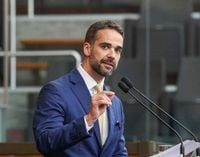As political tides shift in Brazil, Governor Eduardo Leite of Rio Grande do Sul is poised to make a significant change in his political affiliation, likely moving from the PSDB to the PSD. This transition, which has been the subject of much speculation, is expected to be finalized in the coming weeks.
During a recent agenda in Passo Fundo, Leite extended an invitation to former deputy Mateus West to join the PSD and run for a seat in the Assembly in the 2026 elections. West, a staunch supporter of Leite's administration, has been closely associated with the governor since leaving his position as Secretary of Justice to work in the governor's office. This invitation marks a pivotal moment for both Leite and West, as they prepare for the upcoming electoral cycle.
In 2021, the mayor of Passo Fundo, Pedro Almeida, along with former mayor Luciano Azevedo, joined the PSD, indicating a growing trend among local leaders to align with the party. The political landscape in Rio Grande do Sul is shifting, and Leite's anticipated move to the PSD is expected to influence other key figures in the region.
As Leite contemplates this transition, he is not alone in his considerations. Eduardo Riedel, the Governor of Mato Grosso do Sul, is facing a potential isolation within the PSDB following Leite's departure. Riedel, who remains undecided about his political future, is awaiting the outcome of ongoing discussions within the PSDB regarding possible mergers and alliances with other parties. The pressure is mounting, as many believe that Leite's move could serve as a catalyst for Riedel to make a similar decision.
On April 18, 2025, Riedel's administration confirmed that they are internally certain about Leite's impending arrival at the PSD. José Carlos Barbosa, the acting governor, expressed hope that Leite's decision would inspire Riedel to follow suit. "Eduardo Leite has a very close relationship with our state, but it will depend on him," Barbosa remarked. The political dynamics between the two governors are closely watched, especially as Riedel weighs his options amidst the uncertainty surrounding the PSDB's future.
Leite, who has been a member of the PSDB for 24 years, announced on social media that he would finalize his party affiliation decision by the end of April. This timeline coincides with the PSDB's internal discussions about potential mergers, including one with the Podemos party. Some PSDB leaders view this merger as a necessary step to strengthen the party ahead of the 2026 elections.
However, the PSDB is facing challenges. The party has seen a significant decline in its influence, losing more than half of its federal deputies in the 2022 elections and failing to elect any senators. The number of mayors elected also dropped to less than half in 2024. These setbacks have prompted discussions about the party's survival and future direction.
Amidst this backdrop, Leite's potential move to the PSD is seen as a strategic maneuver in light of the upcoming presidential elections in 2026. His affiliation with the PSD could position him as a viable candidate, offering an alternative to both President Lula and other right-wing candidates. Proponents of Leite's move argue that he could represent a centrist option, appealing to voters seeking a departure from the polarized political climate.
The PSD, led by Gilberto Kassab, has already attracted notable figures, including Raquel Lyra, the Governor of Pernambuco, who joined the party in March 2025. This trend of migration from the PSDB to the PSD reflects broader concerns about the future of the traditional party structures in Brazil.
In recent months, Kassab has been actively courting support from influential politicians across the political spectrum. His meetings with Riedel and former governor Reinaldo Azambuja have focused on fostering collaboration between the PSDB and PSD to strengthen their positions for the 2026 elections. However, the prospect of a merger has faced resistance, with some party leaders cautioning against losing the PSDB's historical identity.
As the end of April approaches, all eyes are on Leite and the PSDB's internal deliberations. The outcome of these discussions will not only determine Leite's political future but also shape the landscape of Brazilian politics in the lead-up to the next presidential election. With the stakes higher than ever, the decisions made in the coming weeks could have far-reaching implications for party dynamics and electoral strategies.
In summary, Eduardo Leite's anticipated transition from the PSDB to the PSD is emblematic of the shifting allegiances within Brazilian politics. As key figures like Riedel contemplate their own futures, the political landscape is set for a significant transformation. The upcoming weeks will be crucial as Leite and others navigate their paths in a rapidly evolving political environment.






